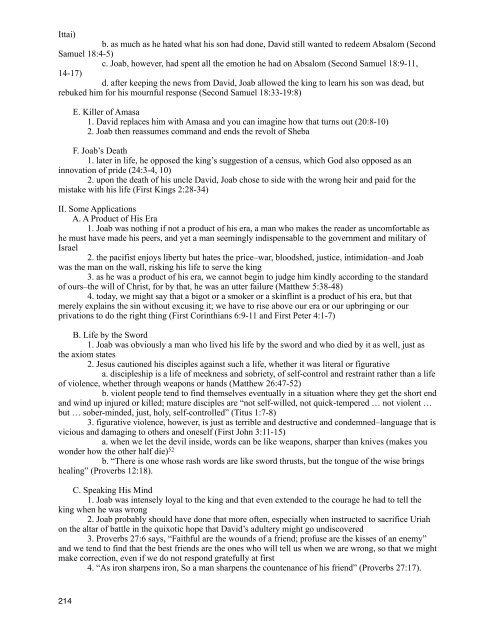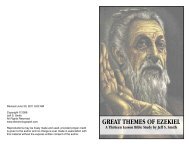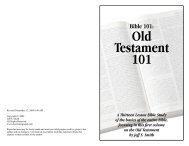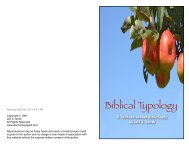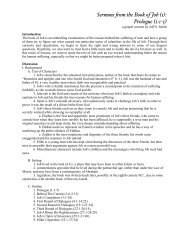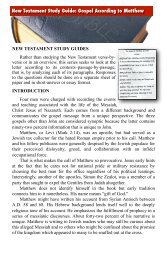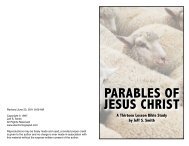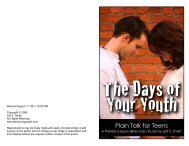Character Studies - ElectronicGospel
Character Studies - ElectronicGospel
Character Studies - ElectronicGospel
- No tags were found...
Create successful ePaper yourself
Turn your PDF publications into a flip-book with our unique Google optimized e-Paper software.
Ittai)b. as much as he hated what his son had done, David still wanted to redeem Absalom (SecondSamuel 18:4-5)c. Joab, however, had spent all the emotion he had on Absalom (Second Samuel 18:9-11,14-17)d. after keeping the news from David, Joab allowed the king to learn his son was dead, butrebuked him for his mournful response (Second Samuel 18:33-19:8)E. Killer of Amasa1. David replaces him with Amasa and you can imagine how that turns out (20:8-10)2. Joab then reassumes command and ends the revolt of ShebaF. Joab’s Death1. later in life, he opposed the king’s suggestion of a census, which God also opposed as aninnovation of pride (24:3-4, 10)2. upon the death of his uncle David, Joab chose to side with the wrong heir and paid for themistake with his life (First Kings 2:28-34)II. Some ApplicationsA. A Product of His Era1. Joab was nothing if not a product of his era, a man who makes the reader as uncomfortable ashe must have made his peers, and yet a man seemingly indispensable to the government and military ofIsrael2. the pacifist enjoys liberty but hates the price–war, bloodshed, justice, intimidation–and Joabwas the man on the wall, risking his life to serve the king3. as he was a product of his era, we cannot begin to judge him kindly according to the standardof ours–the will of Christ, for by that, he was an utter failure (Matthew 5:38-48)4. today, we might say that a bigot or a smoker or a skinflint is a product of his era, but thatmerely explains the sin without excusing it; we have to rise above our era or our upbringing or ourprivations to do the right thing (First Corinthians 6:9-11 and First Peter 4:1-7)B. Life by the Sword1. Joab was obviously a man who lived his life by the sword and who died by it as well, just asthe axiom states2. Jesus cautioned his disciples against such a life, whether it was literal or figurativea. discipleship is a life of meekness and sobriety, of self-control and restraint rather than a lifeof violence, whether through weapons or hands (Matthew 26:47-52)b. violent people tend to find themselves eventually in a situation where they get the short endand wind up injured or killed; mature disciples are “not self-willed, not quick-tempered … not violent …but … sober-minded, just, holy, self-controlled” (Titus 1:7-8)3. figurative violence, however, is just as terrible and destructive and condemned–language that isvicious and damaging to others and oneself (First John 3:11-15)a. when we let the devil inside, words can be like weapons, sharper than knives (makes youwonder how the other half die) 52b. “There is one whose rash words are like sword thrusts, but the tongue of the wise bringshealing” (Proverbs 12:18).C. Speaking His Mind1. Joab was intensely loyal to the king and that even extended to the courage he had to tell theking when he was wrong2. Joab probably should have done that more often, especially when instructed to sacrifice Uriahon the altar of battle in the quixotic hope that David’s adultery might go undiscovered3. Proverbs 27:6 says, “Faithful are the wounds of a friend; profuse are the kisses of an enemy”and we tend to find that the best friends are the ones who will tell us when we are wrong, so that we mightmake correction, even if we do not respond gratefully at first4. “As iron sharpens iron, So a man sharpens the countenance of his friend” (Proverbs 27:17).214


